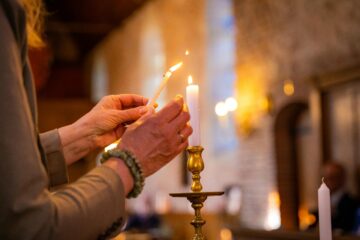A Christian
I am a Christian because the Christian worldview corresponds to reality. Evidence points to the reality that God created the universe, that Christ rose from the dead demonstrating that He is God, and that the Bible is divine rather than merely human in origin.
Three general truths express my reasons concisely.
God created the Universe.
Philosophical naturalism (the worldview undergirding evolutionism) can provide only three explanations for the existence of the universe. That it is an illusion; that it sprang from nothing; or that it has eternally existed.
The first two notions are self-evidently absurd, and the third is devastated by entropy.
That leaves only one plausible explanation. “In the beginning, God created the heavens and the earth.” In an age of empirical science, nothing could be more certain, clear, or correct.
Jesus rose from the dead in vindication of His claim to be God.
In 1 Corinthians 15, St. Paul forwarded the following three-part argument. That Christ suffered fatal torment (one of the most well-established facts of antiquity); that He was buried and raised on the third day according to the Scriptures (Christianity could not have survived an identifiable tomb containing the corpse of Christ); and that He appeared and gave many convincing proofs that He had risen from the dead.
Moreover, what happened as a result of the resurrection is unique in human history. In a span of a few hundred years, a small band of seemingly insignificant believers succeeded in turning an entire empire upside down.
And within days of encountering the resurrected Christ, not merely twelve but thousands of people willingly surrendered their spiritual and sociological traditions.
The Bible is divine rather than merely human in origin.
To begin with, the Christian Scriptures have stronger manuscript support than any other work of classical history—including Homer, Plato, Aristotle, Caesar, and Tacitus. Equally amazing is the fact that the Bible has been virtually unaltered since the original writing, as is attested by scholars who have compared the earliest manuscripts with copies produced centuries later. Additionally, the reliability of the Bible is affirmed by the testimony of its authors, who were eyewitnesses—or close associates of eyewitnesses—to the recorded events, as well as by secular historians who confirm the many events, people, places, and customs chronicled in Scripture.
Furthermore, archaeology is a powerful witness to the accuracy of the New Testament documents. Repeatedly, comprehensive archaeological fieldwork and careful biblical interpretation affirm the reliability of the Bible. Archaeological finds have, for instance, corroborated biblical details surrounding the trial that led to the fatal torment of Jesus Christ: Pontius Pilate did order Christ’s crucifixion, and Caiaphas was the high priest who presided over the religious trials of Christ. It is telling when secular scholars must revise their biblical criticisms in light of solid archaeological evidence.
Finally, the Bible records prophecies of events that could not have been predicted by mere chance or common sense. For example, the book of Daniel (written before 530 BC) accurately foretold the progression of kingdoms from Babylon through the Median and Persian empires to the persecution and suffering of the Jews under Antiochus IV Epiphanes with his desecration of the temple, his untimely death, and freedom for the Jews under Judas Maccabeus (165 BC). It is statistically preposterous that any or all of the Bible’s specific, detailed prophecies could have been fulfilled by chance, good guessing, or deliberate deceit.
As compelling as these three proofs may be, I am also a Christian because Christianity is existentially satisfying. Thus, while Christianity is never a prohibition upon knowledge; it is most certainly the transcending of knowledge—the transcending of all philosophical speculation. Vladimir Lossky might well have said it best, “Christian theology is always in the last resort a means: a unity of knowledge subserving an end which transcends all knowledge. This ultimate end is union with God or deification.”
An Orthodox Christian
I am Orthodox because I hold to the Niceno-Constantinopolitan Creed, which serves as a template for what has been believed from the beginning. As an Orthodox Christian I hold fast to every word of the Nicene Creed without addition or subtraction. In particular, I believe in “one holy, catholic, and apostolic church.”
One: I hold that the Church is one just as God is one. In the words of St. Paul, there is but one Lord, one faith, and one baptism (Ephesians 4:6). And in accord with the High Priestly Prayer of Jesus, the Church must be one even as He and the Father are one (John 17).
Holy: I hold the Church to be holy as God is holy. Christ so loved His Church that He gave Himself for her “that He might sanctify and cleanse her with the washing of water by the Word, that He might present her to Himself a glorious church, not having spot or wrinkle or any such thing, but that she should be holy and without blemish” (Ephesians 5:26–27).
Catholic: I hold the Church to be catholic, meaning undivided and universal. The Church is undivided in that she has preserved the fullness of the faith. As such, she is rightly designated Orthodox in that she has preserved pure and undiluted the faith once for all delivered to the saints. The Church is universal in that she embraces every icon of God without distinction or discrimination. “For as many of you were baptized into Christ have put on Christ, there is neither Jew nor Greek, there is neither slave nor free, nor is there male and female; for you are all one in Christ Jesus and if you are Christ’s, then you are Abraham’s seed, and heirs according to the promise” (Galatians 3:27–29).
Apostolic: I believe in the apostolic succession of bishops through the laying on of hands from the Apostles to the Apostolic Fathers onward to the Eucharistic assembly of every local church in every successive generation. In the vernacular of Vincent of Lérins, I “hold what has been believed everywhere, always, and by all.” I am given to perpetuation rather than to innovation. To the Nicene Creed, without addition or subtraction.
Church: I am an Orthodox Christian because I believe the Church to be “the ground and pillar of the truth” (1 Timothy 3:15). I believe the Church to be far more than an organization. It is a life. It is the reincarnation of Eden. The place where the Orthodox faithful can access the Tree of Life replete with its Eucharistic bounty. Moreover, as Ecumenical Patriarch Bartholomew poignantly put it, “The Church, as a mystery of mutual Trinitarian love, is true to itself only if the circle of love is constantly enlarged, only if new persons are continually being brought within it. Faith in the Triune God signifies that we are each of us missionaries, dedicated to the preaching of the Gospel.”



0 Comments